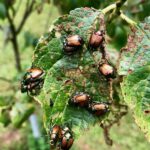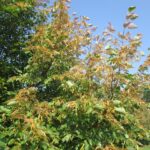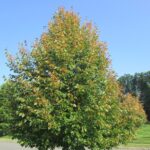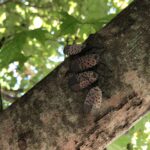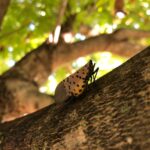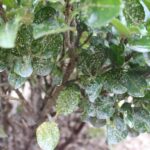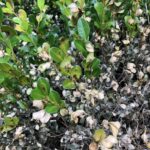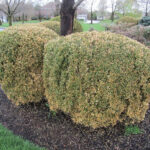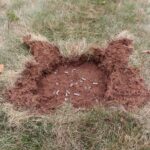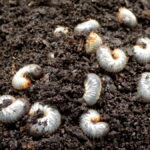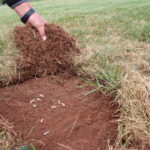Table of Contents
ToggleLast Updated on May 4, 2025
On January 18th 2022, Governor Phil Murphy signed new legislation that affects the use of neonicotinoid pesticides. In summary, the new legislation prohibits any use of neonicotinoid pesticides that is not for agricultural purposes after October 31st, 2023. The intent of this law is to reduce exposure to pollinator insects. In this blog, we will discuss how the new law is going to impact treatments done to your lawn and landscape plants.
What is a neonicotinoid?
Neonicotinoids (Neonics) have been used in agriculture since the 1990s and are one of the most widely used pesticides in the world. They are insecticides that are used to control many common pests found in lawns and landscapes in New Jersey. In addition, they are also in many of the popular flea and tick medications used on pets (neonics are not banned in New Jersey if used on domestic pets). Because neonics are no longer under patent, there are many generics making them an extremely cost-effective option to control insects.
How are they used?
Neonics are commonly used as systemic insecticides used to protect plants from insects that feed on them. A systemic insecticide is one that moves through the plant and provides protection. As an example, Japanese beetles are often found feeding on plants such as roses, cherry trees, plum trees, and even Japanese maples. Neonics can be injected into the soil around the root zone of those plants very early in the spring. The plants will absorb and translocate the product. By the time Japanese beetles come around to feed on the plants in the summer, the plants will be protected and the insects will be controlled once they begin to feed.
Japanese beetles are just one example, there are many other insects that are controlled by neonicotinoids. In the past few years, many of us in New Jersey have noticed invasive spotted lanternflies around our homes and landscapes. Neonics were a great way to control these insects. Lanternflies have a few favorite trees they like to feed on, tree of heaven and a few maple varieties were the primary targets in our service area. We were able to protect those plants with a single systemic treatment that provided control during the entire adult life cycle of the lanternflies. In addition to protecting the plant, it also provided a great way of reducing the population of an invasive species that caused millions of dollars of damage to local crops.
It\’s easier to talk about the insects controlled with neonics because if we look at plants treated with neonicotinoids, the list will likely include all ornamental plants in our area. We’ve already mentioned some of the plants, but other plants treated with neonicotinoids include Magnolias, Azaleas, Boxwoods, Ash Trees, Maple Trees, Hemlocks, Birch Trees, and these are just a few.
Trees and shrubs are not the only plants that benefitted from treatments, your lawn was also protected by neonics. We already discussed the harm Japanese Beetle adults do by feeding on your plants, but they can also cause a lot of harm to your lawn. Beetle adults will lay their eggs in turf, the eggs will hatch into larvae that feed on the roots of grass plants. These larvae are commonly referred to as grubs. If you’ve ever had grubs in your lawn then you are familiar with the amount of damage they can do to turf. Large sections of dead grass can be rolled up like a carpet after grubs feed through an area. Neonics applied to the turf were a great way to preventatively treat for grubs and protect your grass.
We can go on and on with examples of insects controlled by neonics. Rather than go into detail on each one, a few more that you are probably familiar with are boxwood leafminers, scale, adelgids, and even invasive emerald ash borers. In fact, a lot of piercing and sucking insects can be controlled with neonics.
What does this mean for homeowners in New Jersey?
With the current products available for use in New Jersey, the days of a single systemic treatment to protect a plant for the year are behind us. There are a few systemic insecticides available that are not neonics, however, they do not cover a broad spectrum of pests and can’t be used to control many common insects in our area. In addition, the cost of those systemic insecticides will likely exceed the value of the plant in many instances.
With that being said, we still have options to control insects on our landscape plants and turf. Since we can no longer treat plants systemically, we have to treat them when the insects are active. Leafminers are insects that cause a lot of damage to boxwoods each year. The adults are active between April and July and can be targeted during that time frame with monthly contact sprays. The obvious downside to this is going from a single annual treatment to monthly treatments that will need to be applied 3 or 4 times a year to protect the plant. The same is true for many other insect pests in our area, a single treatment will be replaced with much more specialized treatments targeted during the timeframe when those insects are most vulnerable.
What should we do to protect our landscape plants?
As mentioned above, there are some systemic options still available for certain plants, however, the products are much more expensive at this point in time. We do expect costs to come down in the near future as some products come off patent and other new products are developed.
The most common form of treatment now will be specialized contact sprays designed to target specific insects at the most opportune time to treat them. The timing of applications, as well as the specific products used to treat the insects, will vary greatly depending on the plant and insect. If you are in our service area and scheduled for a systemic treatment, then we’ve likely already contacted you to discuss treatment options for your property. If you’re not in our service area, we recommend contacting your local tree company to see what treatment options are available and recommended for your plants.

